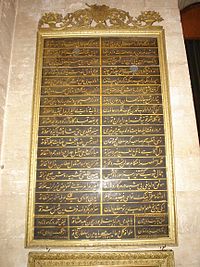Languages of the Ottoman Empire
| Languages of Ottoman Empire | |
|---|---|

A poem about Rumi in Ottoman Turkish.
|
|
| Official languages | Ottoman Turkish |
| Minority languages | Albanian, Arabic, Armenian, Assyrian, Babylonian, Berber, Bosnian, Bulgarian, Cappadocian Greek, all the Caucasian languages, Coptic, Crimean Tatar, Croatian, Domari, Gagauz, Georgian, German, Greek, Hebrew, Hungarian, Italian languages, Judeo-Arabic, Judaeo-Spanish, Kurdish, Latin,Laz, Persian, Polish, Pontic Greek, Romanian, Russian, Ruthenian, Serbian, Somali,Ukrainian, Urum, Vlach, Yevanic, Zazaki |
The language of the court and government of the Ottoman Empire was Ottoman Turkish, but many other languages were in contemporary use in parts of the empire. Although the minorities of the Ottoman Empire were free to use their language amongst themselves, if they needed to communicate with the government they had to use Ottoman Turkish.
The Ottomans had three influential languages: Turkish, spoken by the majority of the people in Anatolia and by the majority of Muslims of the Balkans except in Albania, Bosnia, and various Aegean Sea islands; Persian, only spoken by the educated; and Arabic, spoken mainly in Arabia, North Africa, Mesopotamia and the Levant. Throughout the vast Ottoman bureaucracy Ottoman Turkish language was the official language, a version of Turkish, albeit with a vast mixture of both Arabic and Persian grammar and vocabulary.
Because of a low literacy rate among the public (about 2–3% until the early 19th century and just about 15% at the end of 19th century), ordinary people had to hire special "request-writers" (arzuhâlcis) to be able to communicate with the government. The ethnic groups continued to speak within their families and neighborhoods (mahalles) with their own languages (e.g., Jews, Greeks, Armenians, etc.) In villages where two or more populations lived together, the inhabitants would often speak each other's language. In cosmopolitan cities, people often spoke their family languages, many non-ethnic Turks spoke Turkish as a second language. Educated Ottoman Turks spoke Arabic and Persian.
In the last two centuries, French and English emerged as popular languages, especially among the Christian Levantine communities. The elite learned French at school, and used European products as a fashion statement. The use of Turkish grew steadily under the Ottomans, but, Persian and Arabic remained in use as well. Usage of these became limited, though, and specific: Persian served mainly as a literary language for the educated, while Arabic was used for religious rites.
...
Wikipedia
